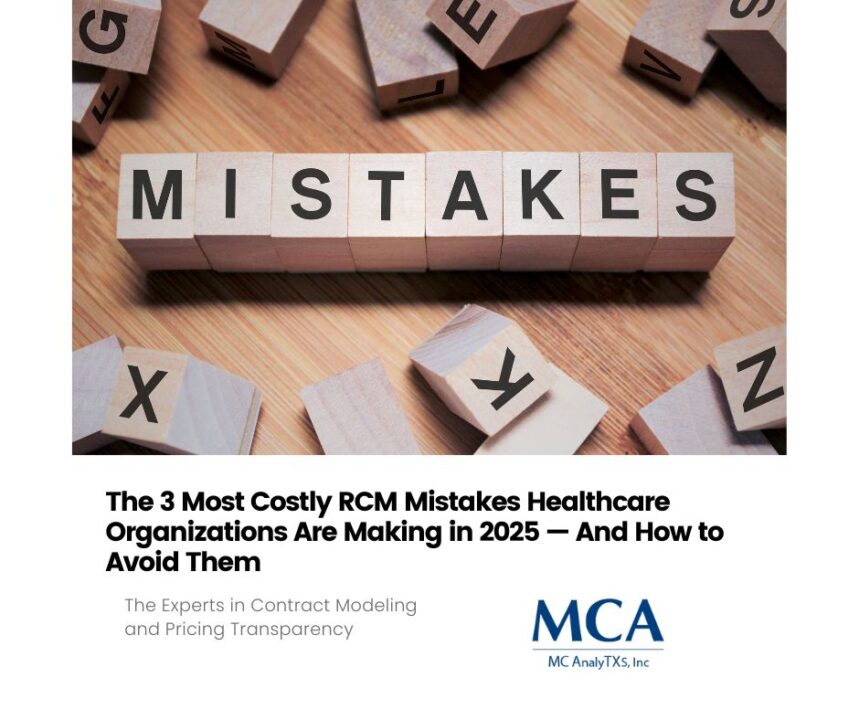

Transforming Healthcare Finances
Revenue Cycle Management (RCM) is one of the most critical aspects of running a successful medical or surgical center. With the complexities involved in billing, claims processing, and patient collections, even the slightest inefficiency can lead to significant financial losses. This blog post aims to shed light on why hospitals and surgical centers should consider partnering with MC AnalyTXs for their RCM needs. We will explore the multifaceted challenges of RCM, the importance of efficient revenue management, and how MC AnalyTXs can be a game-changer in this domain.
The Complex Landscape of Revenue Cycle Management in Healthcare
Navigating the labyrinth of healthcare billing isn’t just daunting; it’s a major operational challenge. Hospitals and surgical centers often grapple with various issues, such as coding errors, claim denials, and delayed payments. These factors can significantly disrupt cash flow and strain financial resources.
Revenue leakage in RCM is a common problem, often resulting from inefficient processes and outdated technologies. When your staff is overwhelmed with administrative tasks, the focus shifts away from providing quality patient care. Thus, the need for a streamlined RCM solution becomes not only a financial necessity but also a critical component of patient care.
The regulatory landscape adds another layer of complexity. Keeping up with changing healthcare laws, payer rules, and compliance requirements can be overwhelming. A single mistake can lead to costly penalties and legal complications, making effective RCM indispensable.
The Importance of Efficient RCM for Financial Health
Revenue Cycle Management isn’t just a back-office function; it’s the lifeblood of your organization. Efficient RCM ensures that every step from patient registration to final payment is optimized for accuracy and speed. This optimization translates to better financial health and operational success for medical and surgical centers.
Accurate billing and rapid claims processing are critical for maintaining a healthy revenue stream. The quicker you can turn around claims, the faster you get paid. This efficiency minimizes the risk of disruptions in cash flow and helps sustain the financial stability of your organization.
An efficient RCM process also ensures compliance with healthcare regulations. By adhering to the latest coding standards and payer rules, you can avoid costly penalties and maintain a good standing with regulatory bodies. This compliance is essential for long-term operational success and sustainability.
MC AnalyTXs A Unique Approach to RCM
MC AnalyTXs brings a revolutionary approach to RCM by leveraging cutting-edge technology, advanced data analytics, and personalized strategies. They understand that each medical and surgical center has unique needs, and they tailor their solutions accordingly.
Their technology-driven approach includes automated claim scrubbing, real-time analytics, and machine learning algorithms that predict and prevent revenue leakage. These tools ensure that your billing processes are always accurate, compliant, and efficient.
Data analytics play a crucial role in MC AnalyTXs’ strategy. They provide actionable insights into your revenue cycle, identifying bottlenecks and opportunities for improvement. This data-driven approach allows for continuous optimization, ensuring that your RCM processes evolve with changing demands and regulations.
Benefits of Partnering with MC AnalyTXs
Partnering with MC AnalyTXs offers numerous benefits that can transform your revenue cycle and overall operational efficiency. One of the most significant advantages is improved revenue. By streamlining billing and claims processing, MC AnalyTXs ensures faster payments and reduced denials, leading to better cash flow.
Operational costs are another area where MC AnalyTXs makes a substantial impact. Automating routine tasks and optimizing workflows reduce the workload on your staff, allowing them to focus on more critical tasks. This efficiency can lead to significant cost savings in the long run.
Enhanced patient satisfaction is another key benefit. By minimizing billing errors and streamlining the payment process, you can provide a better patient experience. Satisfied patients are more likely to return for future services and recommend your center to others, contributing to your reputation and revenue growth.
The Future of RCM in Healthcare Evolving with Innovation
The landscape of Revenue Cycle Management is continually evolving, driven by technological advancements and changing regulations. Staying ahead of these changes is crucial for maintaining efficient RCM processes and ensuring financial stability.
Innovative partnerships, like the one offered by MC AnalyTXs, are instrumental in navigating this evolving landscape. Their commitment to leveraging the latest technologies and data-driven strategies ensures that your RCM processes remain cutting-edge and compliant.
Looking ahead, the integration of artificial intelligence and machine learning in RCM is expected to bring even more efficiencies and accuracy. MC AnalyTXs is at the forefront of these innovations, continually refining their solutions to meet the future needs of healthcare organizations.
Conclusion
In the complex world of healthcare, efficient Revenue Cycle Management is not just a necessity; it’s a competitive advantage. Partnering with MC AnalyTXs offers a strategic pathway to improved revenue, reduced operational costs, and enhanced patient satisfaction.
With their unique approach, technology-driven solutions, and proven track record, MC AnalyTXs is an invaluable partner for hospitals and surgical centers. Don’t wait for financial challenges to escalate. Take the proactive step of optimizing your RCM processes today.
Consider MC AnalyTXs for your RCM needs and set your organization on the path to financial health and operational excellence. Sign up for a consultation and discover how our innovative solutions can transform your revenue cycle.





